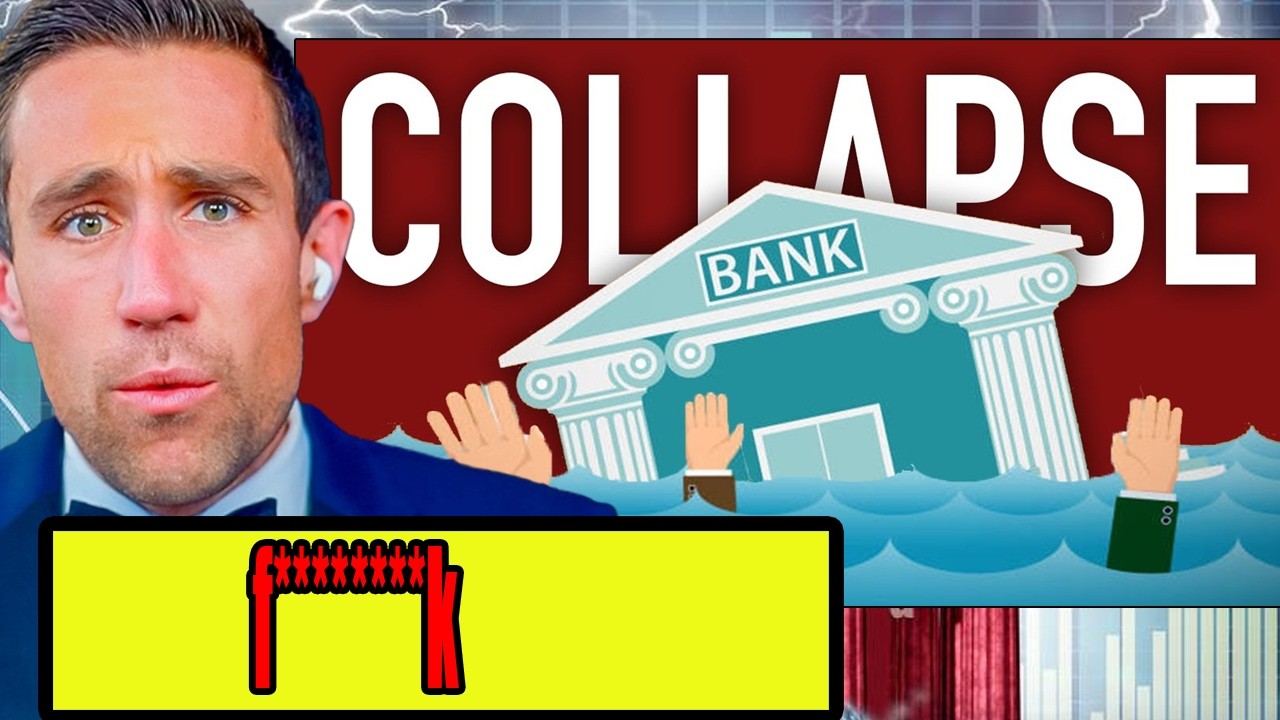Video
Counting My Tip Jar After a Year

Video
5 Rules of Money That Help You Build Wealth

👉 Start Investing in Stock Market 📈 Open Free Demat Account: https://upstox.com/open-account/?f=2YPX
*****************************************************************
👉Consultation Booking Registration Form: https://leads.automationmagnet.com/
👉Book 1-on-1 Guidance Call:https://leads.automationmagnet.com/lp-1
*****************************************************************
👉 Best Software for Option Trading: https://nseoptionchain.ltpcalculator.com/signup
*****************************************************************
👉 Order Candlestick Patterns Book on Amazon: https://amzn.to/4fQYU3G
*****************************************************************
#WealthBuilding #PushkarRajThakur #FinancialFreedom
About Pushkar Raj Thakur :
Pushkar Raj Thakur is India’s Leading Educator & Finance Coach.
He Holds 2 Guinness World Records for the Largest Financial Investment Lesson and Largest Social Media Marketing Lesson.
With 14 Million+ Subscribers on Youtube & 2 Million+ Followers Instagram, he is consistently creating content around Financial Education, Stock Market and Current Affairs.
– NISM Certified Research Analyst
– NISM Certified Mutual Fund Distributor
– IRDA Certified
Follow us on:
👉 Telegram: https://t.me/PushkarRajThakurOfficial
👉 Whatsapp: https://bit.ly/PRTWhatsappChannel
👉 Facebook: https://bit.ly/PushkarRajThakurFb
👉 Instagram: https://www.instagram.com/pushkarrajthakur
👉 Youtube: https://youtube.com/@PushkarRajThakurOfficial
👉 Twitter: https://x.com/PushkarRThakur
👉 LinkedIn: https://www.linkedin.com/in/pushkarrajthakur
👉 http://www.pushkarrajthakur.com
To Join Our Courses Call @ 9999 470 710
source
Video
billionaire|| billionaire by his own work | trillions dollar in one frame, Paisa, Elon musk

Power of money|| billionaire by his own work | trillions dollar in one frame, Paisa, Elon musk
The credit goes to respective owners
Don’t give me compywright
DM for removal
Follow me on instagram:-
https://www.instagram.com/hustlevoltt?igsh=MTF6dXU2cXgwYWZ2Zg==
#shorts #viralshorts #trendingshorts #ytshorts
source
Video
MAJOR XRP WARNING!!! IS IT *OVER*??? (US CHOSES BANKS OVER RIPPLE?!?!)

XRP is back at the center of U.S. crypto regulation as Congress advances market structure legislation and Ripple responds to shifting political and banking priorities.
In this video, I break down the recent Clarity Act developments, why the White House appears aligned with major banks, and how XRP, RLUSD, and tokenization are being positioned inside regulated financial infrastructure. This is about policy, institutions and market structure.
Timestamps
00:00 U.S. crypto regulation update
00:45 Brad Garlinghouse on market structure
01:40 Senate Agriculture Committee advances Clarity Act
02:35 Bipartisan tensions and White House stance
03:55 CFTC authority and digital commodities
05:15 SEC coordination and regulatory overlap
06:10 XRP ETF flows and institutional demand
07:45 Tokenization and future financial rails
09:30 Canary Capital on XRP, Hedera, Solana
10:25 RLUSD growth and stablecoin adoption
11:30 Ripple partnerships and settlement flows
13:40 Retirement accounts and crypto access
This video is for viewers focused on institutional crypto adoption, regulated digital assets, and the future of market structure and payments infrastructure.
🔥Thanks for supporting the channel. Like, share, and comment if this helped clarify what’s really happening.
💳 Uphold – Trade, Spend & Earn XRP Rewards
➖ U.S. Debit Card: https://uphold.sjv.io/559kj9
➖ Uphold Website: https://uphold.sjv.io/dOmGMq
🔸4% on elite card / 2% on virtual card🔸
🛡️Hardware Wallets I Use for XRP
D’CENT Biometric Wallets
– Single Device – 18% Discount ($159 → $129)
Biometric Wallet – Affiliates
– Two-Pack – 31% Discount ($318 → $219)
Biometric Wallet 2X Package – Affiliates
Ledger – Official Store
https://www.ledger.com/crypto-sensei
🔗Contact & Collaborations
– Business: cryptosensei@cryptonairz.com
– Collabs: BD Manager – @Jaalyn_T (Telegram)
– Collab Form: https://forms.gle/E6fskio5BBvd4zVn9
– Social Links: https://linktr.ee/Crypt0Sensei
(YouTube partnerships & brand deals only – no agencies)
📰FREE XRP Newsletter: https://joincryptonairz.com/Newsletter
❗Full Legal & Regulatory Disclaimer
https://docs.google.com/document/d/1T_wTsSkXDZqdgKDUOKfIEKF-a7ur2kX8gw-e3aAq_Q4/edit?usp=sharing
#xrp #ripple #clarityact #xrpetf
source
Video
Financial Literacy 101: Save Better, Invest Wiser with Armand Bengco | The Daily Dish

Join us as we welcome Armand Bengco, lead financial literacy advocate of Better Thrive PH, to share practical tips on saving, investing, and building healthier financial habits in 2026.
Learn why the beginning of the year is the best time to reassess your finances, how to manage bonuses, common mistakes to avoid, and how to set realistic financial goals.
Discover the essential rules for first-time investors and why financial literacy is key to long-term security.
Don’t miss this inspiring guide to achieving financial success—tune in now!
📺 Free TV Ch. 31, Cignal Ch. 24, Samsung TV Plus, TCL Smart TVs, Blast TV, AmasianTV
📱 Cignal Play, BNC YouTube and Facebook
Visit our Website: https://bnc.ph
Check out our official social media accounts:
https://www.facebook.com/bncphl
Tweets by bncdotph
https://www.instagram.com/bnc.ph
@bnc.ph
https://www.youtube.com/@bncphl
#bilyonaryonewschannel #bnc #dailydish
Warning: Unauthorized use of any BNC videos without proper approval will lead to legal action to the fullest extent of the law.
source
Video
Is Money Soap a Scam?
Video
I’M DONE WITH CRYPTO
Video
How to get financial freedom at an early age?

In this episode, we sit down with Mr Biren Parekh to discuss money, investing, real estate, and the practical decisions that shape long-term financial freedom.
From his early life and first salary to investing frameworks, asset allocation, exits, passive income, and early retirement, this conversation covers real, actionable insights that everyday investors can relate to. We also discuss buying vs renting a home in Mumbai, how much money is “enough,” and how young earners can plan for financial independence.
This episode focuses on practical financial thinking, not hype, making it especially useful for salaried professionals, young investors, and anyone planning long-term wealth.
About The Guest
Biren Parekh is a seasoned BFSI professional and investor with nearly three decades of experience across banking, financial services, and technology. He is currently associated with CRISIL Limited and is based in Mumbai. Alongside his corporate leadership roles, he is an active investor with a strong interest in long-term wealth creation, asset allocation, and practical financial decision-making. His investing approach is shaped by real-world experience, disciplined thinking, and a focus on risk management rather than short-term speculation.
💡 What we spoke about
• Biren Parekh’s early life and money lessons
• His first salary and first investment
• Stocks that delivered outsized long-term returns
• Renting vs buying a home in Mumbai
• When it actually makes sense to buy a house
• What passive income really means and what it includes
• Ideal asset allocation at different income levels
• When investors should exit a stock
• How a 25-year-old earning ₹1 lakh a month can plan to retire by 40
• How much money is needed to be financially free
• Silver prices and their relevance in asset allocation
⏰ Timestamps
0:21 – How was it growing up? Where did you grow up?
0:52 – What was your first salary?
1:31 – When was your first investment?
3:08 – Have any of your shares grown significantly over time?
5:47 – If I am a 25-year-old earning ₹1,00,000 a month, where should I invest to retire by 40?
8:38 – What is passive income and what does it include?
13:24 – How much money does one need to be financially free?
15:36 – At what salary package can one decide to buy a house?
18:16 – Ideal asset allocation on a ₹50,000 monthly salary
19:55 – When should investors ideally exit a stock?
23:00 – Is your home rented or owned? When did you buy your first home?
23:33 – Is it better to rent or buy a home in Mumbai?
#BirenParekh,#InvestorTalk,#PersonalFinanceIndia,#InvestingInIndia,#WealthCreation,#FinancialFreedom,#AssetAllocation,#StockMarketIndia,#MoneyMindset,#PassiveIncome,#EarlyRetirement
source
Video
Money Vs Power by Right To Shiksha
Video
DUMP CRYPTO FOR GOLD & SILVER? BITCOIN, XRP, ETHEREUM, & SOLANA ANALYSIS!

Brian from Santiment joined me to review the crypto market metrics for Bitcoin, Ethereum, Ripple XRP, Solana, and Avax. We also look at the surging price and sentiment for gold and silver.
🖥️ Sign up with Santiment to get quality crypto metrics – https://app.santiment.net/pricing?fpr=thinkingcrypto Get 25% discount with code THINKINGCRYPTO
💡Get the (Re)Thinking Crypto Book on Amazon – https://www.amazon.com/dp/B0D2525DYX
🖥️ Learn Crypto with Expert Commentary – http://MyCryptoCourse.com
Sponsors:
🔐 Safely Store your Crypto with Trezor Hardware Wallets – https://affil.trezor.io/SHlz
🏠 Propy (PRO) is a blockchain-based real estate marketplace and decentralized title registry that leverages smart contracts to facilitate property transactions globally https://propy.com/home/ & https://propy.com/home/ownyourtomorrow/
✅ VeChain is a versatile enterprise-grade L1 smart contract platform https://www.vechain.org/
🏦 Learn about iTrustCapital’s powerful Premium Custody Account (PCA) and tax-advantaged Crypto IRA platforms https://www.itrustcapital.com/go/thinkingcrypto
🌟Uphold – Signup with Uphold. https://uphold.sjv.io/gbED4X
Terms Apply. Cryptoassets are highly volatile. Your capital is at risk.
📰 Sign up for the Free Thinking Crypto Weekly Newsletter https://thinkingcrypto.substack.com/
✅ Become a Channel Member – https://www.youtube.com/channel/UCjpkwsuHgYx9fBE0ojsJ_-w/join
🔥 Buy Merch & support the Podcast https://my-store-574b5b.creator-spring.com/
🧙♂️Merlin – http://tinyurl.com/MerlinTCYouTube
“I am a Merlin partner and get compensated for purchases made through links in this content”this content”
Follow on social media:
➡️ X(Twitter) – https://x.com/thinkingcrypto
➡️ Facebook – https://www.facebook.com/thinkingcrypto/
➡️ LinkedIn – http://linkedin.com/company/thinking-crypto
➡️ Instagram – https://www.instagram.com/thinkingcrypto/
➡️ TikTok – https://www.tiktok.com/@thinkingcrypto5
➡️ Threads – https://www.threads.net/@thinkingcrypto
➡️ Website – https://www.ThinkingCrypto.com/
🔊 Listen to content on Apple Podcasts – https://podcasts.apple.com/us/podcast/thinking-crypto-news-interviews/id1458945676
🔊 Listen to content on Spotify – https://open.spotify.com/show/221AV5A65v7uYEsuMviVKl
💼Business Inquiries💼
hellothinkingcrypto@gmail.com
⏰ Time Stamps ⏰
00:00 Intro
03:34 Bitcoin analysis
10:31 Bitcoin whale activity
14:31 Bitcoin MVRV
18:00 Ethereum Analysis
19:27 XRP Analysis
25:02 Solana Analysis
26:34 Avax Analysis
=================================================
📺 Interviews Playlists 📺
– All Interviews – https://youtube.com/playlist?list=PL5rDfH3ofGEe8rCbwJojpipmwwkvWhbQD
– Must Watch Interviews – https://youtube.com/playlist?list=PL5rDfH3ofGEdqEaSrjC3UHOQdw1eyeYRU
– Bitcoin Interviews – https://youtube.com/playlist?list=PL5rDfH3ofGEcjtw8URfr7-DfBi_J_O0ip
– Altcoin Interviews – https://youtube.com/playlist?list=PL5rDfH3ofGEeZ3QES9lD1f59YTWuQv-uv
– Crypto Regulators & Politicians Interviews – https://youtube.com/playlist?list=PL5rDfH3ofGEdsqA213osf2u-PbT1b7uM4
– Investment Firms & Hedge Funds – https://youtube.com/playlist?list=PL5rDfH3ofGEfa-HsusfQBB6blH3KR09mj
– Internet Pioneers & Entrepreneurs – https://youtube.com/playlist?list=PL5rDfH3ofGEdqCYps3eexnovm2WNWeP3o
=================================================
#Crypto #Bitcoin #Gold #Silver #CryptoNews #Cryptocurrency #BTC #BitcoinNews #ETF #News #Ripple #XRP #XRPNews #RippleXRP #Ethereum #EthereumNews #ETH #Solana #money #investing #trading #Altcoin #Altcoins #NFTs #Metaverse #Podcast #ThinkingCrypto
=================================================
– The Thinking Crypto Podcast is your home for the best Crypto News and Interviews – crypto, cryptocurrency, crypto news, bitcoin, bitcoin news, xrp, xrp news, ripple, ripple news, ripple xrp, ethereum, ethereum news, cardano, ada, solana, altcoins, defi, news, interviews, podcast, metaverse, nft, altcoin daily, cryptosrus, coin bureau, altcoin news, bitcoin today, markets, investing
=================================================
Disclaimer – The Thinking Crypto podcast and Tony Edward are not financial or investment experts. You should do your own research on each cryptocurrency and make your own conclusions and decisions for investment. Invest at your own risk, only invest what you are willing to lose. This channel and its videos are just for educational purposes and NOT investment or financial advice.
Note that links included in this description might be affiliate links. If you purchase a product or service with the links that I provide I may receive a small commission. There is no additional charge to you! Thank you for supporting my channel so I can continue to provide you with free content each week!
source
Video
The Banking Collapse is STARTING | Financial Crisis 2.0.

🚨 Sign up for the Gemini Credit Card: https://Gemini.com/kevin 🚨 ⚠️✅💎 Meet Kevin Membership: https://MeetKevin.com 💎 ✅ ⚠️
⚠️🔥 HouseHack Startup: https://househack.com 🔥⚠️ (Read any solicitation paperwork before investing; investing involves risk – this video is not a solicitation).
🤯💥 Life Insurance Sponsor: https://metkevin.com/life💥🤯
#GeminiCreditCard #CryptoRewards This video is sponsored by Gemini. All opinions expressed by the content creator are their own and not influenced or endorsed by Gemini.
The Bitcoin Credit Card™ is a trademark of Gemini used in connection with the Gemini Credit Card®, which is issued by WebBank. For more information regarding fees, interest, and other cost information, see Rates & Fees: gemini.com/legal/cardholder-agreement
Some exclusions apply to instant rewards; these are deposited when the transaction posts. 4% back is available on up to $300 in spend per month for a year (then 1% on all other Gas, EV charging, and transit purchases that month). Spend cycle will refresh on the 1st of each calendar month. See Rewards Program Terms for details: gemini.com/legal/credit-card-rewards-agreement
Checking if you’re eligible will not impact your credit score. If you’re eligible and choose to proceed, a hard credit inquiry will be conducted that can impact your credit score. Eligibility does not guarantee approval.
The appreciation of cardholder rewards reflects a subset of Gemini Cardholders from 10/08/2021 to 04/06/2025 who held Bitcoin rewards for at least one year. Individual results will vary based on spending, selected crypto, and market performance. Cryptocurrency is highly volatile and may result in gains or losses. This information is for general informational purposes only and does not constitute investment advice. Past performance is not indicative of future results.
😇 Affiliates and Paid Promotions 😇
▀▀▀▀▀▀▀▀▀▀▀▀▀▀▀▀▀▀▀▀▀▀▀▀▀▀
➡️ Life Insurance Sponsor: My favorite life insurance you can get in as litle as 5 minutes! https://metkevin.com/life
➡️ Webull Sponsor: My favorite stock-app for charting and trades! https://metkevin.com/webull
➡️ HSA Sponsor: Tax Deductions via a Health-Savings Account: https://metkevin.com/hsa
➡️ My 360-Camera Sponsor: https://metkevin.com/360x
*See terms and conditions at affiliated webpages. Offers are subject to change. These are affiliated/paid promotions.
🥰 SOCIAL MEDIA & DISCUSSIONS 🥰
▀▀▀▀▀▀▀▀▀▀▀▀▀▀▀▀▀▀▀▀▀▀▀▀▀▀
Twitter / X: https://twitter.com/realMeetKevin
Tik Tok: https://www.tiktok.com/@realmeetkevin
Instagram: https://www.instagram.com/meetkevin
🚀 COURSE INQUIRIES 🚀
▀▀▀▀▀▀▀▀▀▀▀▀▀▀▀▀▀▀▀▀▀▀▀▀▀▀
Email staff@meetkevin.com for course requests or support.
➡️ SPONSORSHIP INQUIRIES ➡️
▀▀▀▀▀▀▀▀▀▀▀▀▀▀▀▀▀▀▀▀▀▀▀▀▀▀
Email meetkevin@creatorsagency.co for sponsorships.
📝 LEGAL DISCLAIMER 📝
▀▀▀▀▀▀▀▀▀▀▀▀▀▀▀▀▀▀▀▀▀▀▀▀▀▀
This video or description does not constitute personalized financial, legal, real estate, investment, or other advice (we don’t know your situation; so it’s impossible to provide you personalized advice.). Therefore, evaluate your own suitability. Assume any referenced product or service is a paid promotion, though Kevin does his best to let ya know if a mention is paid or unpaid. While Kevin’s experience with a product or service may be good, your experience may suck – Kevin can’t be response for that; so be warned and conduct your own diligence. Any mention of stocks or analysis may be reliable today, but not tomorrow or even hours later. Recognize businesses and people change rapidly and the accuracy of information cannot be guaranteed. Additionally, any mention of being a pilot, flying a jet, or showing or commenting on aviation is solely incidental to part-91 flight operations Kevin Paffrath is taking for his own purposes. Any videos of FAA-related or aviation-related content are solely incidental to flights that would have occurred regardless of video content, though some may see the aircraft Kevin flies as an advertisement for the products and services, investment strategies, or wealth strategies Kevin promotes. Kevin Paffrath is licensed with the California Department of Real Estate under 01893132. His broker is HouseHack, license 02236137.
source
-

 Crypto World5 days ago
Crypto World5 days agoSmart energy pays enters the US market, targeting scalable financial infrastructure
-
Crypto World6 days ago
Software stocks enter bear market on AI disruption fear with ServiceNow plunging 10%
-

 Politics5 days ago
Politics5 days agoWhy is the NHS registering babies as ‘theybies’?
-

 Crypto World5 days ago
Crypto World5 days agoAdam Back says Liquid BTC is collateralized after dashboard problem
-

 Video1 day ago
Video1 day agoWhen Money Enters #motivation #mindset #selfimprovement
-

 Tech2 hours ago
Tech2 hours agoWikipedia volunteers spent years cataloging AI tells. Now there’s a plugin to avoid them.
-

 NewsBeat5 days ago
NewsBeat5 days agoDonald Trump Criticises Keir Starmer Over China Discussions
-

 Politics2 days ago
Politics2 days agoSky News Presenter Criticises Lord Mandelson As Greedy And Duplicitous
-

 Crypto World4 days ago
Crypto World4 days agoU.S. government enters partial shutdown, here’s how it impacts bitcoin and ether
-

 Sports4 days ago
Sports4 days agoSinner battles Australian Open heat to enter last 16, injured Osaka pulls out
-

 Fashion5 days ago
Fashion5 days agoWeekend Open Thread – Corporette.com
-

 Crypto World4 days ago
Crypto World4 days agoBitcoin Drops Below $80K, But New Buyers are Entering the Market
-

 Crypto World2 days ago
Crypto World2 days agoMarket Analysis: GBP/USD Retreats From Highs As EUR/GBP Enters Holding Pattern
-

 Crypto World5 days ago
Crypto World5 days agoKuCoin CEO on MiCA, Europe entering new era of compliance
-
Business5 days ago
Entergy declares quarterly dividend of $0.64 per share
-

 Sports2 days ago
Sports2 days agoShannon Birchard enters Canadian curling history with sixth Scotties title
-

 NewsBeat1 day ago
NewsBeat1 day agoUS-brokered Russia-Ukraine talks are resuming this week
-

 NewsBeat2 days ago
NewsBeat2 days agoGAME to close all standalone stores in the UK after it enters administration
-

 Crypto World11 hours ago
Crypto World11 hours agoRussia’s Largest Bitcoin Miner BitRiver Enters Bankruptcy Proceedings: Report
-

 Crypto World5 days ago
Crypto World5 days agoWhy AI Agents Will Replace DeFi Dashboards







